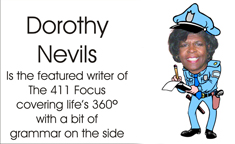
The letters just keep changing their clothes in the middle of a paragraph, or even a sentence,...
Contributed By:Dorothy Nevils
Grammar Patrol: Read vs. Read
Phonics gets us in all kinds of trouble, that is, if you depend on the letters to help you say the word. You see, the letters and their arrangements don’t follow a well-laid path, one we can depend on to lead us correctly to the correct end.
It’s neither straight nor narrow, just wobbles all over the place, and folks get tripped up! The letters just keep changing their clothes in the middle of a paragraph, or even a sentence, and leaves us looking the part of an idiot, a worn-out idiot at that! It’s like driving on the wrong side of the road, but, unlike the wrong way driver, the wrong worder doesn’t get pulled over and given a ticket. Oh, no! He goes on and on, on and on, and I dare you to pull him over! You’re gonna get your feelings hurt! Let me show you what I mean.
Stop right there for a moment—you can use your finger to hold your spot, if it helps—and read the title above, “Read vs. Read.” Did you get confused? Did you think I am the one confused—or worse? You can say it. My feelings won’t be hurt. Be honest. Did you say both words the same? Did you assume the e was short… or maybe long… or did you just want to throw up your hands because you didn’t have a clue? Have you reached a spot where you want to just pull up a rock, plop down—not so hard, and wait for the grammar patrol? You’re in luck. She just rounded the bend.
Okay. Let’s see where you’re getting off course. Hmm… Seems to me like you want to put all similar sounds in the same lane. After all, that’s how you started with the language: E’s say their name… But, wait! You can’t just jump to that conclusion! Sometimes letters don’t say their names, but like a crook caught doing something wrong, they’ll say somebody else’s name, or no name at all… just stand there and say, “You figure it out!” So, hop in the Sonotabuick, and I’ll take you for a spin around the block.
We started off with r-e-a-d. There are four letters, but we’re just concerned about one sound, the sound of the two vowels in the middle of the word. Which one says its name? There’s a 50/50 chance of getting it right.
Let me introduce something here: R-E-A-D is a verb. That verb keeps the same vowels for present tense as for past tense. However, the sound changes. In PRESENT tense, the sound is Ē, or, as they say in 2nd grade, the E says its name. So “read” sounds like “REED.” In PAST tense, the sound is “short”, and “read” sounds like RED, although the letters REMAIN THE SAME.
Now this is what I want you to remember: R-E-A-D is the ONLY verb that KEEPS the SAME LETTERS, but CHANGES sound for past tense. I can think of NO other such VERB that can say that!
Let’s go through a few verbs with ē in the middle and see if they make a change for past tense:Dream, speak, free, feed, heed, heat, feed, dream, cheer, meet, leap, defeat, speak, deal, lead…
“Oh, no!” you scream. “Lead doesn’t fit! Lead doesn’t change!”
Oh, yes, it does, my dear! Lead changes to led!? I know it’s a hard pill to swallow, but no matter how many times you’ve seen lead written as past tense, IT. IS. WRONG! It CHANGES. It drops the A. Just as “feed” changes to fed and “breed” changes to bred, lead changes to LED!
Now, I’ve made it pretty easy for you to remember.
Don’t you dare say, “Aha! Gotcha! “Beat” stays the same.”
Just let it go. Beat, unlike “read,” keeps the same sound! Go back and read the paragraph that begins with “Now…”
Story Posted:01/06/2017
|